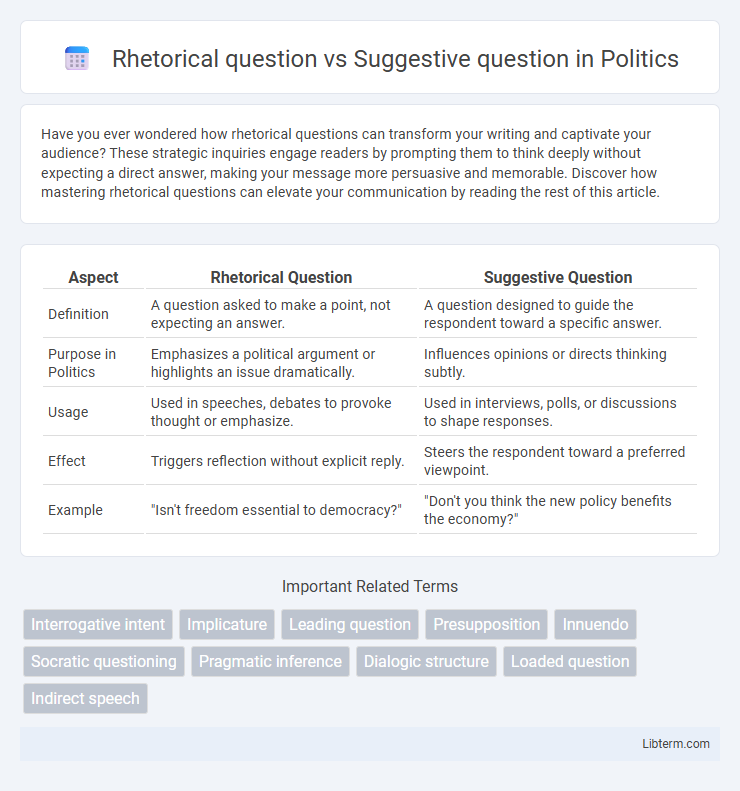Have you ever wondered how rhetorical questions can transform your writing and captivate your audience? These strategic inquiries engage readers by prompting them to think deeply without expecting a direct answer, making your message more persuasive and memorable. Discover how mastering rhetorical questions can elevate your communication by reading the rest of this article.
Table of Comparison
| Aspect | Rhetorical Question | Suggestive Question |
|---|---|---|
| Definition | A question asked to make a point, not expecting an answer. | A question designed to guide the respondent toward a specific answer. |
| Purpose in Politics | Emphasizes a political argument or highlights an issue dramatically. | Influences opinions or directs thinking subtly. |
| Usage | Used in speeches, debates to provoke thought or emphasize. | Used in interviews, polls, or discussions to shape responses. |
| Effect | Triggers reflection without explicit reply. | Steers the respondent toward a preferred viewpoint. |
| Example | "Isn't freedom essential to democracy?" | "Don't you think the new policy benefits the economy?" |
Understanding Rhetorical Questions
Rhetorical questions are designed to provoke thought without expecting an actual response, often emphasizing a point or engaging the audience emotionally. Unlike suggestive questions, which aim to guide or influence the respondent's answer, rhetorical questions function as persuasive tools in speeches, literature, and everyday communication. Understanding rhetorical questions involves recognizing their role in highlighting ideas and prompting reflection rather than soliciting information.
Defining Suggestive Questions
Suggestive questions are designed to imply or lead respondents toward a particular answer, often embedding the desired response within the question itself. Unlike rhetorical questions, which do not expect an answer and serve to make a point, suggestive questions influence opinions and guide the conversation subtly. In marketing and psychology, suggestive questions are used strategically to shape perceptions and encourage specific reactions.
Key Differences Between Rhetorical and Suggestive Questions
Rhetorical questions are designed to make a point or emphasize an idea without expecting an answer, often used in speeches or persuasive writing to engage the audience. Suggestive questions imply a preferred answer or guide the respondent toward a specific conclusion, commonly employed in interviews or marketing. The key difference lies in intent: rhetorical questions seek to provoke thought or highlight information, while suggestive questions influence or steer response behavior.
Functions of Rhetorical Questions in Communication
Rhetorical questions primarily function to engage the listener by prompting reflection without expecting an actual answer, emphasizing a point or expressing emotion in communication. They enhance persuasion by subtly reinforcing the speaker's argument and creating a shared understanding or emphasis. Unlike suggestive questions, which imply a preferred answer to guide responses, rhetorical questions serve to stimulate thought and highlight ideas without seeking explicit feedback.
The Purpose of Suggestive Questions
Suggestive questions aim to subtly influence the respondent's answer by implying the desired response or steering the conversation in a particular direction. Unlike rhetorical questions, which are posed for effect without expecting an answer, suggestive questions encourage engagement and guide decision-making or opinions. This technique is commonly used in sales, therapy, and negotiations to elicit agreement or reveal preferences without direct assertion.
Psychological Impact of Rhetorical Questions
Rhetorical questions engage the listener's mind by prompting internal reflection without expecting an actual response, enhancing persuasion through cognitive involvement. These questions stimulate emotional resonance and increase the likelihood of message retention by subtly guiding thought processes. Unlike suggestive questions, which imply desired answers and direct behavior, rhetorical questions unlock deeper psychological engagement by fostering self-generated insights.
Influence of Suggestive Questions on Opinions
Suggestive questions subtly guide respondents toward a desired answer, often shaping opinions by framing choices in a biased manner. Unlike rhetorical questions, which highlight a point without expecting an answer, suggestive questions influence beliefs by embedding assumptions that sway perception. This technique is widely used in marketing and political discourse to direct consumers' and voters' attitudes effectively.
Common Examples of Rhetorical vs Suggestive Questions
Rhetorical questions, like "Is the sky blue?" or "Who doesn't want to be happy?" are used to emphasize a point rather than elicit an actual answer. Suggestive questions, such as "Don't you think this approach is better?" or "Wouldn't it be great to finish early?" guide the respondent towards a specific answer or opinion. Common examples highlight that rhetorical questions assert ideas, while suggestive questions subtly influence decisions or thoughts.
Effective Use in Writing and Speech
Rhetorical questions engage audiences by prompting reflection without expecting an answer, enhancing persuasive impact in writing and speech. Suggestive questions guide listeners toward a desired conclusion, subtly influencing opinions while encouraging active participation. Effective use involves balancing clarity and purpose, ensuring questions reinforce key messages and maintain audience interest.
Avoiding Misuse: Best Practices for Both Question Types
Rhetorical questions, designed to provoke thought without expecting an answer, must be used with clarity to avoid confusing the audience or appearing insincere. Suggestive questions, which imply a desired response, should be framed carefully to prevent manipulation or bias in communication. Effective use of both involves maintaining audience awareness and ensuring the purpose of each question type aligns with the intended dialogue or persuasion goal.
Rhetorical question Infographic

 libterm.com
libterm.com